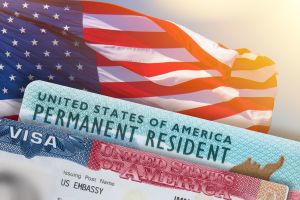Securing a family-based Green Card allows loved ones to build a future as permanent residents in the United States. Whether reuniting with a spouse, child, or parent, the process creates new opportunities and stability. Immigration rules are complex, but knowing the requirements beforehand can increase the chances of approval and a smoother experience.
For Houston residents, understanding the steps involved is key to a successful application. This guide breaks down who qualifies, how to apply, and what challenges to expect. With careful preparation and proper legal advice, you can confidently move forward and bring your family closer.

Eligibility For A Family-Based Green Card
U.S. citizens and Green Card holders can sponsor (petition) loved ones from abroad for permanent residency. However, eligibility depends on the relationship between the sponsor and the applicant. The primary classifications are immediate relatives and family preference categories, each with different benefits and qualifications.
Immediate Relatives
This category applies to specific family members of U.S. citizens. You fall under the category of immediate relative if you are the petitioner’s spouse, unmarried child under 21, or parent (if the petitioner is at least 21). Unlike other family-based Visa categories, immediate relatives are not subject to annual Visa limits. This means they do not have to wait for a Visa number to become available.
Family Preference Categories
If you don’t qualify as an immediate relative, you may still be eligible under the family preference system. Its categories include certain relationships with U.S. citizens and lawful permanent residents (LPRs):
- F1: Unmarried children (21 or older) of U.S. citizens.
- F2A: Unmarried children under 21 and spouses of LPRs.
- F2B: Unmarried children (21 or older) of LPRs.
- F3: Married children of U.S. citizens.
- F4: Siblings of U.S. citizens (if the petitioner is 21 or older).
These categories have annual Visa limits, so applicants may wait months or even years before they can proceed in the process. Understanding where you fit in these categories takes top priority before focusing on the application process.
The Application Process
Every step in the process of obtaining permanent residency impacts the outcome. Failing to meet a requirement or misunderstanding a procedure can result in delays or denials. Accuracy and attention to detail are essential to successfully reuniting families in the United States.
File The Petition
The process starts with the petitioner submitting Form I-130, Petition for Alien Relative, to U.S. Citizenship and Immigration Services (USCIS). This document establishes a valid family relationship between the petitioner and the applicant.
Along with Form I-130, supporting documents are required, such as proof of the petitioner’s U.S. citizenship or permanent residency. Birth or marriage certificates and other affidavits or evidence to confirm the relationship may also be necessary. Once USCIS receives the petition, it sends Form I-797, Notice of Action, to acknowledge receipt of the application.
Monitor Visa Availability
U.S. immigration law limits the number of family preference Visas issued each year. The Immigrant Visa Bulletin, published monthly by the U.S. Department of State (DOS), tracks Visa availability based on priority dates (when a petition is filed). Immediate relatives are not subject to these limits, as they can apply for Green Cards without waiting for a Visa number.
However, family preference applicants must wait for a Visa number to become available. Due to high demand, especially from countries with large applicant pools, these applicants may face extended waiting periods before receiving a Green Card.
Adjustment Of Status Or Consular Processing
Once a Visa becomes available, applicants must either apply for an Adjustment of Status (AOS) or go through Consular Processing, depending on whether they are inside or outside the U.S.
- Adjustment of Status (AOS): Applicants within the U.S. can apply for a Green Card by filing Form I-485, Application to Register Permanent Residence or Adjust Status, with USCIS. This process involves biometrics collection, a medical exam, and an interview with an immigration officer.
- Consular Processing: Applicants outside the U.S. must complete their Green Card application through Consular Processing in a U.S. embassy or consulate. This step requires submitting supporting documentation and attending an interview to determine the applicant’s eligibility for an immigrant Visa.
Receiving The Green Card
Once approved, the Green Card is mailed to the applicant’s U.S. address. For applicants arriving from abroad, the card may be issued within 90 days of arrival in the U.S. This card serves as official proof of lawful permanent residency and grants the holder the right to live and work in the country.
Though the process varies by category and location, the goal remains the same—bringing families together. While many applications move forward without issue, challenges that require careful planning and preparation may arise.
Potential Challenges & Considerations
Applying for a family-based Green Card isn’t always straightforward. Knowing some of the challenges in advance can help you avoid delays and prepare a stronger case.
Financial Requirements
Petitioners must demonstrate they can financially support their family member by submitting Form I-864, Affidavit of Support. The sponsor’s income must meet or exceed the federal poverty guidelines for their household size. If the petitioner’s income falls short, a joint sponsor can provide additional financial support to meet the requirement.
Changes In Circumstances
Life events like marriage, turning 21, or even the death of a petitioner can affect eligibility. For example, a child turning 21 may move from the immediate relative category to a preference category, resulting in a longer wait time. In some cases, if a petitioner passes away, the application can continue under humanitarian reinstatement. Legal guidance becomes invaluable in such unique circumstances.
Inadmissibility Issues
An applicant can be deemed inadmissible to the U.S. for various reasons, including criminal history, previous immigration violations, or certain health-related issues. However, waivers are sometimes available to overcome these grounds of inadmissibility, depending on the circumstances and the type of violation.
Understanding these challenges enables applicants to take proactive steps. However, because of the complexity of the immigration process, some applicants may need additional guidance.
FAQs About Family-Based Green Cards
The road to permanent residency can raise many questions, especially for first-time applicants. Understanding what to expect can help them avoid common mistakes and prepare confidently for each step.
How Do You Prove A Family Relationship For Your Application?
Applicants must submit comprehensive documents, such as birth certificates, marriage licenses, or adoption records, to verify their relationship with the petitioner. In some cases, additional evidence, such as photos, correspondence, or financial records, may be required. If documents alone are not sufficient, USCIS may also request DNA testing.
How Long Does The Process Take?
Processing times depend on the applicant’s category, the petitioner’s status, and USCIS’s workload. Immediate relatives may have shorter wait times, while family preference applicants may wait years due to annual Visa limits. Checking USCIS processing times and the Visa Bulletin provides the most up-to-date estimates.
Can You Expedite Your Application?
USCIS does not offer premium processing for family-based Green Cards. However, you can request expedited processing in urgent situations. USCIS considers requests for certain cases involving severe financial loss, emergencies, or humanitarian reasons. Approval depends on USCIS’s discretion and requires strong supporting evidence.
Immigration rules and policies can change, affecting processing times and eligibility requirements. Staying informed and seeking reliable guidance can help families navigate the system more smoothly.
Houston Texas Immigration Lawyers Streamlines The Process
Applying for a family-based Green Card can feel burdensome, especially with changing policies and unexpected delays. Many applicants struggle to gather the proper documents, meet financial requirements, or prepare for interviews. That’s where our firm takes charge. At Houston Texas Immigration Lawyers, we guide families through every stage of the process, helping them avoid pitfalls and confidently move forward.

Our team provides personalized support, from eligibility evaluations to interview preparation. We assist with completing and organizing application forms to ensure the correct submission of all necessary evidence. If challenges arise, such as financial concerns or inadmissibility issues, our team diligently explores solutions. Our attorneys ensure you’re fully prepared for what’s ahead, whether adjusting your status in the U.S. or applying through consular processing.
Family-based Green Cards enable U.S. citizens and lawful permanent residents to sponsor specific relatives, allowing them to live together in the United States. The application process includes filing a petition, monitoring Visa availability, and completing either Adjustment of Status or Consular Processing. Applicants must meet financial requirements and address any potential changes in circumstances.
Being prepared for these challenges increases the chances of success. At Houston Texas Immigration Lawyers, we work closely with families to simplify the process and address any obstacles. From the initial petition to securing permanent residency, our team helps you at every stage.




